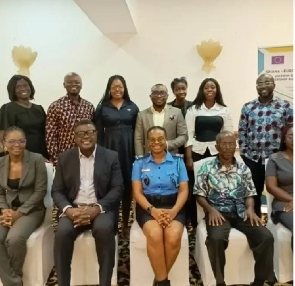 Six private sector institutions participated in the two-day training
Six private sector institutions participated in the two-day training
The Compete Ghana Programme has successfully conducted a comprehensive two-day technical assistance training workshop for the Ministry of Trade and Industry on the implementation of the Ghana-EU Economic Partnership Agreement (iEPA) and related accompanying measures.
The aim of the workshop was to equip the private sector with the knowledge and expertise to foster economic growth and enhance trade facilitation.
Six private sector institutions participated in the two-day training on exports requirements under the Economic Partnership Agreement (EPA), which sought to ensure that more of Ghana’s products could be marketed on the European market.
It was organized by the European Union (EU), Ministry of Trade and Industry, and Compete Ghana, an EU-funded programme designed to contribute to improved economic governance. The training has 10 modules and focuses on Customs Procedures and Trade Facilitation under the EPA.
Mr. Nicholas Gebara, Team Lead of Compete Ghana, said the EPA aimed at increasing trade and reducing barriers between the EU and Ghana, and facilitate trade and exports to the EU. “We work at the institutional level to monitor that the agreement is being applied, see the fiscal reforms, and present our findings to joint committees between the EU and Ghana, to discuss the progress of the implementation,” he said.
Mr. Gebara said the participants were expected to comprehend the fundamental principles guiding the agreement to boost exports, support Ghanaian firms, and network for cooperation and coordination.
Mr. Dode Seidu, a Trade and Facilitation Expert said trade facilitation constituted agreements between the EU and Ghana to benefit exporters and that the training would equip them with tools to improve their evidence-based advocacy.
“When we are opening our various markets, AfCTA, EU and ECOWAS, how competitive is Ghana, and this is where the representatives of the private sector play a crucial role in advocating on how to improve the competitiveness here in Ghana,” he said. “By the end of the day, these modules should allow and help to build a common understanding among the institutions from the public and the private sectors so that they will engage themselves on how to enhance exports to the EU.” The six institutions are the Ghana National Chamber of Commerce and Industry, Ghana Export Promotion Authority, Free Zones
Board, Ghana Association of Banks, Federation of Associations of Ghanaian Exporters, and Association of Ghana Industries.